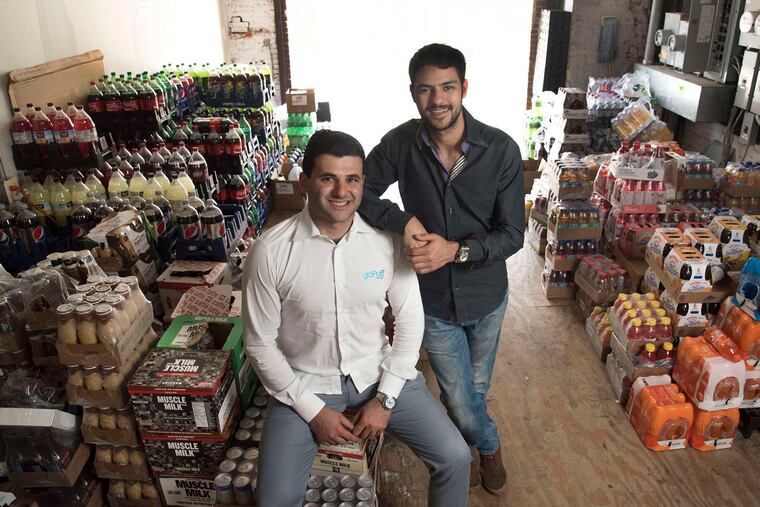Another $1 billion for GoPuff as out-of-town capital floods Philly firms
Two more Philadelphia companies score large piles of capital, plan growth

Two Philadelphia companies on Tuesday announced big expansion plans fueled by rich, out-of-town investors.
GoPuff, the Spring Garden Street-based beer and snacks delivery service with local hubs and driver networks in 41 states, has raised $1.1 billion more to expand deliveries of groceries, beauty products and “mystery bags.”
And Renovacor, which builds treatments for rare diseases using research from Temple University, is the latest U.S. company to go public through the use of a special-purpose acquisition company (SPAC), in a $116 million deal.
GoPuff’s latest investment has doubled its previous capital-raisings, tapping hedge funds and other Wall Street investors who believe that the rush of deliveries will last a lot longer than the virus that has kept millions at home for the last year.
The company will use the money to add to its 250 local warehouses and 161 BevMo!-brand beer stores, and hire more engineers to speed its ordering technology. GoPuff also wants to add foreign stores, the company said, though it hasn’t said which countries it would target.
On top of its familiar menu of sandwiches, junk food, beer, and soft drinks, GoPuff also plans new products. It has lately added local and national suppliers for baby and beauty products, fruits and vegetables, nut- and grain-based snacks, and themed “mystery boxes” containing product selections.
The digital delivery service, which employs more than 7,000, typically delivers to customers who order online, for $1.95, payable electronically, plus tips to drivers. The company’s profits depend on marking up the products they sell. They haul deliveries in their own vehicles during all hours from locations in downtown, college and residential neighborhoods.
The company said this latest fund-raising values GoPuff at $8.9 billion, a sign of the premium investment pros now place on digital services even if they aren’t profitable: That’s more than the combined value of WSFS, the Philadelphia area’s largest bank; Urban Outfitters, its largest retailer; and Unisys, its largest tech company.
The new money “validates” GoPuff and its “massive global opportunity,” Yakir Gola, who cofounded the company with Rafael Ilishayev while they were Drexel students in the early 2010s, said in a statement.
The lead investor in GoPuff’s new equity financing is D1 Capital Partners, Penn grad Daniel Sundheim’s $20 billion New York-based hedge fund.
Sundheim is hedging his bets: He is also a director of InstaCart, a larger GoPuff rival. But “GoPuff is in a league of its own,” Sundheim insisted, given the founders’ and their digital-retailing veterans’ record for exceeding rapid-growth targets.
Others who invested in GoPuff’s latest fund-raising include the Fidelity investment group of Boston; Scottish investment manager Baillie Gifford; Aldridge Capital Partners of Vienna, Va., an early investor in Amazon and eBay; New York-based Reinvent Capital, an early investor in Lyft and SpaceX; and Japan-based, Saudi-funded SoftBank Vision Fund 1, which invested $750 million in GoPuff in 2019 and promised more. GoPuff raised $380 million more last year.
Investor billions have so far been easier to find than profits for other companies in GoPuff’s generation of smartphone-app-based local-delivery services.
DoorDash, which went public last year, is worth $43 billion on the stock market despite losses of nearly $500 million last year on sales of $3 billion. But its share price is down more than $100, to $131.76 Tuesday, since it peaked last month, a sign of how volatile the market for fast-growing, promising but as-yet unproven companies can be.
GrubHub, an older, restaurant-focused delivery service that also loses money, is worth nearly $6 billion but has lost more than half its value since peaking three years ago, as competition has increased.
Instacart, which has delayed plans to sell shares in an initial public stock offering (IPO), was valued at $39 billion, more than four times GoPuff’s latest valuation, in an investment round earlier this month. Its new investors include GoPuff backers D1 and Fidelity, among others.
These companies don’t actually have to turn a profit to make fortunes for their early investors. Some fans hope they will be acquired by Amazon, Uber Eats or even Instacart, which may find it cheaper to buy ready-made local-delivery networks such as GoPuff’s than to keep building their own.
Temple doc’s big bucks
Renovacor Inc., an eight-year-old Philadelphia gene-therapy company, has agreed to go public through an acquisition by Chardan Healthcare Acquisition 2 Corp., a SPAC set up by New York investment bank Chardan Capital Markets as part of a wave of SPACs designed to take advantage of the billions surging into U.S. stock markets.
The deal will pump up to $116 million into Renovacor: $86 million previously raised by Chardan for just such an investment, plus $30 million in a new private share sale funded by large investors including Chardan’s health-care arm, past Renovacor investor Acorn Bioventures, and others.
Renovacor said it will use the money to run clinical trials for its lead product candidate, an adeno-associated virus-based therapy targeting a particular form of heart muscle disease that strikes middle-aged people and usually kills them within five years, and set up preclinical research for others.
The company promises “single-administration curative therapies” in hard-to-treat diseases, and could develop other treatments, Thomas Needham, investor Broadview Ventures’ representative on Renovacor’s board, said in a statement.
Renovacor has been run since 2018 by Magdalene Cook, a physician and veteran private-equity investor and consultant. Gbola Amusa serves as chief science officer and executive chairman. The company was founded by Temple professor and former medical school dean Arthur M. Feldman. The deal should close by June.